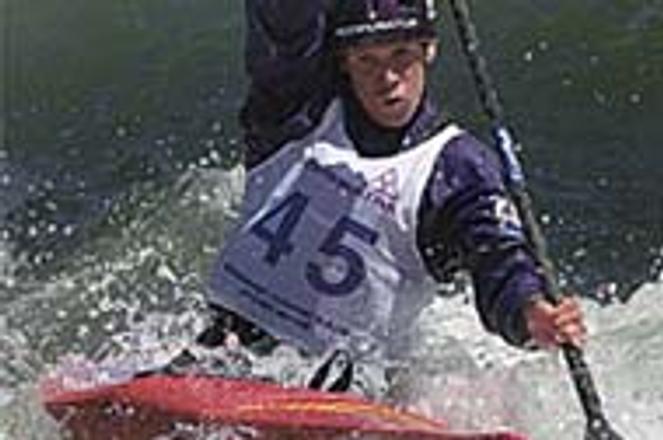White water kayaker Martin Martikán, who won gold at Atlanta '96, is one of the pillars of a strong Slovak canoeing and kayaking contingent.photo: TASR
If past successes serve as any indication, the Slovak canoe and kayak team may very well see more than one representative standing atop the winner's podium come September at the Sydney Olympics. Raging through the rapids for the Slovak team are some of the world's best paddlers, as proven by recent top finishes in championship events.
"Whitewater kayaking has been the most successful sport in Slovakia since the [1996] Atlanta Olympics. Every year, we win more medals," said Peter Mráz, coach of the women's kayaking team.
The results of the Slovak canoe and kayak team speak for themselves. Slovak stars to keep an eye out for in the wild water at the Sydney games include Elena Kaliská, who won the European championships for women's K1 in 1998 and the twin-brother C2 team of Peter and Pavol Hochschorner, who took top honours at the European championships in 1998 and 2000, and won the world championships in 1999 (canoeing and kayaking competition is divided into four categories: male and female single-person kayak (K1), single-man canoe (C1) and dual-man canoe (C2).
But Michal Martikán, competing in the C1 competition, stands as Slovakia's best hope for Sydney gold. Among his slew of accomplishments, Martikán boasts a gold medal in the 1996 Atlanta games, a world championship in 1997, a second place finish in the European championships in 1998 and a third place in the 1999 world championships in Spain. Three separate times, Martikán has been voted Slovak Sportsman of the Year.
Mráz said the strength of the Slovak team became clear after the country's 1993 split with the Czech Republic when a talented but young squad of athletes began maturing into internationally competitive senior-team members. Having firmly established themselves both home and abroad, Mráz said, today's juniors faced an arduous task in earning a spot on big clubs with more experienced paddlers.
Anton Zérer, spokesman for the Slovak Olympic committee, said that he would head to Australia with high expectations that past achievements would carry over to Sydney. "We expect that we will have three medal winners with Martikán, the Hochschorner brothers and Kaliská," he said.
In all the whitewater disciplines, competitions pit the athletes against the clock as they thrash through the torrent while navigating a set of slalom gates. The competitors are ranked by the fastest combined times of their two runs. It's this aspect of the sport, explained Kaliská, that keeps the tension high until the very end.
"Kayaking is very interesting and entertaining, and in the last three years it has been attracting more and more people. You add the times of your two rounds together to get your total, like in slalom skiing, and the suspense is always high until the last competitor crosses the finish line," she said.
For Kaliská, the Sydney games present a chance for redemption from what she felt was a subpar performance at her first Olympic showing at the Atlanta games, where she placed 19th. Echoing her coach, Kaliská said she had the goods to be in medal contention.
"I am striving for a medal in the summer Olympics in Sydney and will do my utmost to achieve this goal," she said. "It's hard to say what country I have to worry about most in whitewater kayaking - it's always changing. But I would say that right now, Slovakia is among the best, along with the Czech Republic, France and the United States."
Entering into their first Olympics, the Hochschorner brothers also hope to come home with something extra for the mantel, but see the competition in a slightly different light. "It would be nice to earn a medal - it's a dream. But we see it as a victory just to be competing in the Olympics." Pavol said.
When not competing, the Slovak canoe and kayak team hones its skills on a stretch of river near Čuňovo, about 20 kilometres downstream from Bratislava. This new facility recently replaced the old training grounds in northern Slovakia's Liptovský Mikuláš, a move that has improved both the convenience and quality of the training.
Additional reporting by Nina Camarová and Michala Bielíková


